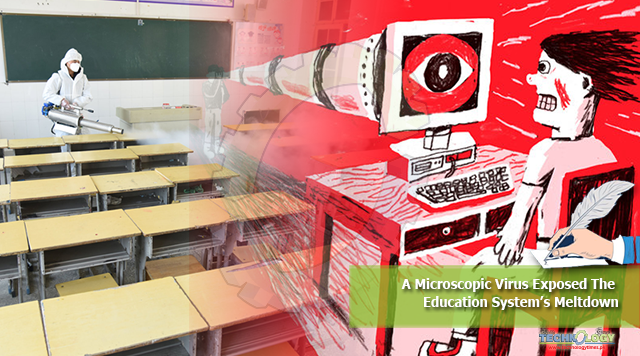A Microscopic Virus Exposed The Education System’s Meltdown : ON March 15, we were told we might need to vacate the university premises. A day later, we were told to stay home and stay safe.

By Sameen Motahhir
ON March 15, we were told we might need to vacate the university premises. A day later, we were told to stay home and stay safe. When Covid-19 hit Lahore, almost all universities went into lockdown mode and the situation that was to ensue for the next two weeks became uncertain and surreal. It was a critical time, and if any organisation could have stepped in to take the reins and provide guidance, the tables might have been turned. But no one did.
Almost 120 days later, the predicament is extremely unstable and institutions now face the wrath of the student population, substandard quality online classes, no faculty training, no exam or admission schedules and a wasted year.
In response to this state of utter despondency, student fees have remained the same (in some cases have even risen by up to 40 per cent), and faculty have been threatened with pay cuts. Essentially, Covid-19 has exposed the education system’s meltdown.
Complaints of all types have been piling up and the numbers of disgruntled employees and students has risen exponentially. But the rise of disaffection among students points to only one thing – something has truly gone wrong at the most fundamental level.
The Pakistani education system has teetered for many decades, and now a microscopic virus is about to topple it completely. As I wrote this, students were arrested in Balochistan for a peaceful protest, with many male and female students manhandled. This problem, which may have originally stemmed from an educational context, is now burgeoning into a moral catastrophe.
What can be done to salvage education?
It is crucial at this stage for senior academics in higher education institutions — who pride themselves on teaching organisational methods, business skills, education, political science, economics, etc — to take up the cause and provide suggestions to the HEC.
It is also imperative for the HEC to create a council of experienced academics that they listen to and that can help solve problems rather than present knee-jerk reactions like ‘let’s get grad students straight into a PhD programme’ (which could never work in Pakistan).ARTICLE CONTINUES AFTER AD
Far from being in complete opposition for the sake of opposition — this is constructive criticism — whatever one may think of governmental agencies and a painfully slow bureaucracy, saving the educational system in an emergency scenario was never meant to be a one-person job.
It was always meant to be a collaborative effort with the intelligentsia supporting the HEC in its fight. Blaming the HEC is not the answer, as the crux of the problem lies in the incompetency that has ravaged the entire system for decades.
So, what can be done to salvage education in 2021? The two major problems that the HEC faces are to deliver quality online education and to address poor internet connectivity in rural areas.
Unfortunately, the HEC dragged its heels in April 2020 when they were faced with the proposition of rolling out their ‘Online Readiness’ policy. This lack of foresight, at such a crucial time, meant universities were on their own in training their faculties and designing their courses.
In fact, if time and money were invested in online education, the profits gleaned from it could exceed that of face-to-face education. Universities could make huge profits with low maintenance centres, staff could have greater autonomy, students could learn from whomever and wherever they want. Education would become truly global. This side of online education was never showcased.
Connectivity in rural areas was an issue that should have been addressed very early on, but the delayed and inadequate response of administrations caused anger and dismay. I have previously written about creating VPNs or even van-driven mobile hotspots that could be parked near communal areas, such as mosques.
Mosques are public spaces where students can gather, maintain SOPs and access Wi-Fi. Almost all rural areas have mosques; it could have been a start. No single solution can solve the connectivity problem, but a multi-pronged approach could have helped.
Another way to tackle this is to call back only students from rural areas to reside in hostels. Those in metropolitan areas would remain in their homes to lessen the burden on staff and the spread of infection. Fewer students in hostels, where universities could maintain necessary facilities under strict SOPs, could help ensure that students who need basic facilities would have access to them.
Let me end this with a plea: every student who has to climb a mountain to get better Wi-Fi reception, has to starve to have their voice heard, has to get punched and thrown to the ground for having the courage to defend their basic human right, is the responsibility of all the faculties, administrations and the HEC. The unfortunate reality is that we — who are older, wiser and more educated — have become amoral and heartless.
Originally published at DAWN NEWS